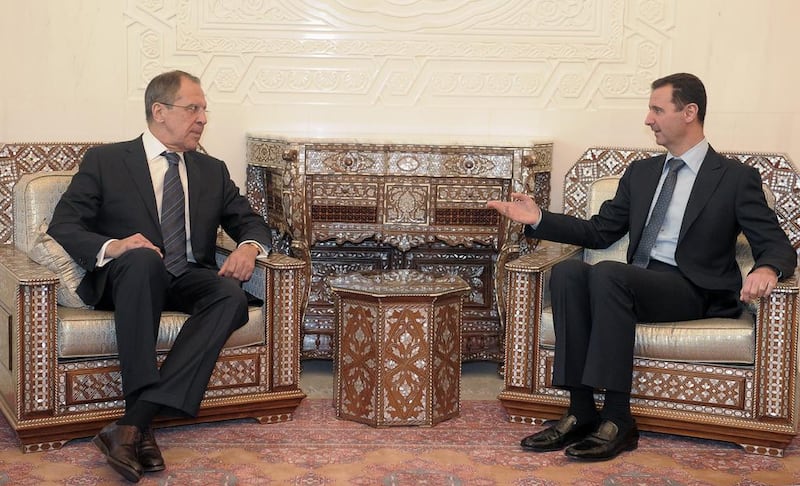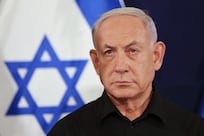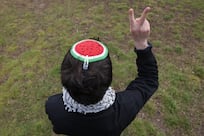As the Syrian regime totters and begins to show signs of cracking, it’s no surprise that its allies are intensifying their commitment to maintaining the dictatorship at all costs. As Russian and Iranian forces begin to play an increasingly direct role in the Syrian conflict, several straightforward truths about that war, and its international ramifications, are becoming painfully obvious.
The extent of the direct involvement of Russian forces is unclear. Some maintain that Russian advisers are merely in Syria to train Syrian government forces. But others suggest that, at the very least, Russia is preparing to defend key areas of strategic interest to itself, particularly related to its naval base at the Mediterranean port of Tartus.
It is the last remaining Russian base outside the former Soviet Union, and is the warm water port that was a valued Russian prize since the time of the tsars. There are also strong indications that Russia is preparing a military airbase south of the port city of Latakia, a major stronghold of Bashar Al Assad. Moreover, Russian troops may already have been involved in some of the fighting.
American intelligence believes that Russia is preparing to deploy Mikoyan MiG 31 and Sukhoi Su-25 fighter planes to the Latakia area.
Russia has said that it has Iranian permission for military overflights to Syria, after being denied such privileges by Bulgaria, which had come under American pressure to say no to Moscow.
Iran is also reportedly increasingly involved in the fighting on the ground in Syria, with Israeli and other sources saying that hundreds of Iranian Revolutionary Guards have been deployed recently in support of Hizbollah fighters. These forces are key elements in the struggle for the area around Zabadani near the Lebanese border.
The regime now controls about a quarter of the territory of Syria. Mr Al Assad still holds most areas crucial to his regime: the Lebanese border, a corridor leading north to and through Damascus, and all the way to the Alawite coastal area.
But the stepped-up international intervention on behalf of Mr Al Assad clearly demonstrates the extent to which he is losing. For most of the past four years, American inaction has been predicated on not wishing to see the collapse of governance institutions in the country, as if they were somehow separable from the regime itself. But given that the regime has been reduced to operating in a small part of the country, this logic has long since broken down.
The Russian and Iranian interventions also demonstrate that the supporters of the Syrian dictatorship are much more committed to maintaining their ally and securing the necessary outcome than Mr Al Assad’s international opponents have been. We can safely assume this is just the beginning of their increased commitment.
Russia claims it is surprised by the international outcry, pointing out that it has made no secret of arming and supporting the dictatorship throughout the entire conflict. In a sense, that’s fair: Russia has indeed been blatant in its support for a government that has waged an unrelenting war on its own people for the sake of power, and has suffered no international consequences for doing so.
Iran, too, has made it clear from the outset that it was prepared to stop at nothing, including risking the political and military well-being of its key proxy group, Hizbollah in Lebanon, in a major intervention in the Syrian conflict that has been going on for several years. It was only a matter of time before Iran’s Revolutionary Guards themselves began fighting on the ground, and for Russian advisers, pilots and special forces to also act decisively in defence of their ally.
It is extraordinary that Russia has received a free pass in all of this, particularly in parts of the Arab world. The bitterness displayed towards American policy, which indeed has been misguided and counterproductive, is quite unmatched by anything similar directly towards Russia, which is infinitely more culpable. American “sins” in Syria are those of omission. Russia has been guilty of innumerable crimes of commission, and has been a direct partner in the Syrian calamity.
Russia is attempting to frame its intervention in terms of “counterterrorism” and the international campaign against ISIL. This is laughably hypocritical, because Mr Al Assad and ISIL enjoy a symbiotic relationship in which they need each other to thrive and survive. Yet there are disturbing signs that several European states, anxious about refugees and other spillover effects of the Syrian conflict, may be moving in the direction of seeing the dictatorship not as a cause of terrorism, which it is, but as a potential counterweight. That would be a tragic error.
The forces that have brought us the Syrian calamity, including the rise of ISIL, are intensifying their intervention and their determination to shape the future of that country. The question for everybody else is whether they will continue to have a relatively free hand. Or will they finally face concerted, coordinated opposition that, at the very least, forces them to accept a political compromise that involves the end of a brutal dictatorship that has been willing to crucify its own society in the name of raw power?
Hussein Ibish is a senior resident scholar at the Arab Gulf States Institute in Washington
On Twitter: @ibishblog





